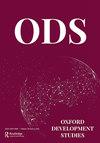‘A long way from earning’: (re)producing violence at the nexus of shame and blame
IF 1.2
Q3 DEVELOPMENT STUDIES
引用次数: 1
Abstract
ABSTRACT Symbolic violence is (re)produced within families at the nexus of blame and shame. This paper presents an understanding of symbolic violence that extends beyond processes of internalisation, in which shame is directed against the self, to questions of processes of reproduction within families, in which shame is externalised through blame. Drawing on mother-tongue life-history interviews with mothers and grandmothers in rural KwaZulu-Natal, the paper explores how this nexus of blame and shame is situated at the intersect of race and gender. It is bound by intergenerational poverty and educational exclusion that span the apartheid and post-apartheid eras in South Africa. Our understandings of gendered poverty thus need to attend to these intergenerational processes of shaming, in which pervasive neoliberal discourses around individual effort and success mask structural constraints, potentially damaging relationships within families and across social networks.“离赚钱还有很长的路要走”:(重新)在羞耻和指责之间制造暴力
象征性暴力是在家庭内部,在指责和羞耻的关系中重新产生的。本文对象征性暴力的理解超越了内化过程,在内化过程中,羞耻感是针对自我的,也延伸到了家庭内部再生产过程的问题,在家庭内部,羞耻感通过指责而外在化。本文通过对夸祖鲁-纳塔尔农村母亲和祖母的母语生活史采访,探讨了这种指责和羞耻的关系是如何处于种族和性别的交叉点上的。它受到南非种族隔离和后种族隔离时代代际贫困和教育排斥的束缚。因此,我们对性别贫困的理解需要关注这些代际羞辱过程,在这些过程中,围绕个人努力和成功的普遍新自由主义话语掩盖了结构性限制,可能会破坏家庭内部和社会网络之间的关系。
本文章由计算机程序翻译,如有差异,请以英文原文为准。
求助全文
约1分钟内获得全文
求助全文
来源期刊

Oxford Development Studies
DEVELOPMENT STUDIES-
CiteScore
2.70
自引率
0.00%
发文量
20
期刊介绍:
Oxford Development Studies is a multidisciplinary academic journal aimed at the student, research and policy-making community, which provides a forum for rigorous and critical analysis of conventional theories and policy issues in all aspects of development, and aims to contribute to new approaches. It covers a number of disciplines related to development, including economics, history, politics, anthropology and sociology, and will publish quantitative papers as well as surveys of literature.
 求助内容:
求助内容: 应助结果提醒方式:
应助结果提醒方式:


